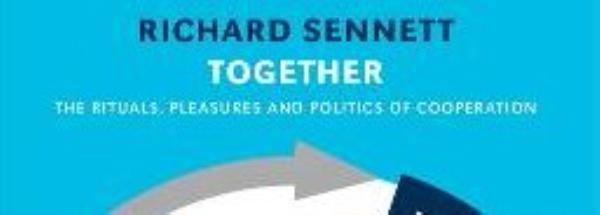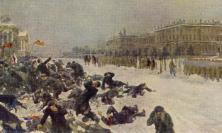Saul Alinsky’s pioneering, mid-twentieth century work in community organising in Chicago continues to inspire and shape many civil society movements today, Citizens UK for example. For those of us working to develop Leeds Community Organising in the same tradition, Richard Sennett’s latest work, Together: The Rituals, Pleasures and Politics of Cooperation, sounds as if it should provide a handy manual of how to proceed. This book, however, is far more challenging than that; Sennett provides a deep critique of the way our societies are developing in the twenty-first century.
Sennett’s starting point is his assertion that modern society is actively de-skilling people in practising cooperation: ‘people are losing the skills to deal with intractable difficulties as material inequality isolates them, short term labour makes their social contracts more superficial and activates anxiety about the other. We are losing the skills of cooperation needed to make a complex society work.’ This loss of cooperation for Sennett is deeply lamentable: ‘Cooperation oils the machinery of getting things done and sharing with others can make up for what we may individually lack. Cooperation is embedded in our genes but cannot remain stuck in routine behaviour, it needs to be deepened and developed.’ He challenges this routine behaviour and indeed our very understanding of cooperation by digging into its biological and philosophical roots. He refers to the Platonic distinction between ‘dialectical’ and ‘dialogical’ discourses, favouring the latter approach, with the openness and empathy it entails, when it comes to cooperation. How we talk to and communicate through gesture with one another is vital, and demands thought and effort.
The analysis throughout has a strong economic emphasis and Sennett draws particularly on his detailed assessment of the job centres for the unemployed in downtown New York. He notes in detail the impact of the shift to service sector and part-time temporary work, and rising inequalities (‘the capitalist is becoming an apex predator’ [p. 134]), all of which contribute to weakening ties of cooperation in society. ‘A new character type is emerging in modern society, an uncooperative self, ill-disposed for dealing with complexity and difference’ (p. 30). The way back to cooperation, says Sennett, is through the rediscovery of our aptitude for ‘listening well’, of the ‘subjunctive mood’ and of the courtly medieval virtue of ‘sprezzatura’ (lightening up and not taking oneself too seriously).
The argument is enriched by the diversity of experience on which the author draws: his own experience as a musician cooperating in an orchestra, as well as his life's work as a sociologist. This breadth allows him to cite practical examples of the approaches he advocates, such as:
I particularly like the practice at the Hampton and Tuskegee Institutes, ending each day with prayers during which the achievements of individuals were named; every individual was named as having achieved something even if what they had accomplished would seem trivial to sophisticated outsiders ... singling out a distinctive contribution each person made to the community for the common good (p. 82).
But Sennett’s focus is not simply the individual. Relating his own experience of the pioneering ‘settlement projects’ in poorer West Side Chicago - which he links back to Robert Owen and the factory towns movement - Sennett draws a useful, historical distinction between the social and the political (‘top-down’) left. Solidarity, he argues must be forged from the bottom up, not the top down. The difference he suggests is between ‘political cooperation’ (coalitions of elites which break down under strain) and the ‘politics of cooperation’, which need constantly working at and in whose tradition Alinsky worked. He takes a swipe at British coalition politics (p. 118) and does not see the concept of the Big Society, undercut by a withdrawal of economic resources, as a way forward. Rather he draws us towards the monastic tradition, the hospitality houses of the Catholic Worker movement in America and the Kibbutz, in his chapter on ‘The Quest for Community’.
This work, a crystal clear read, is peppered by aperçus such as: ‘today’s children are becoming more dependent on the objects they consume than one another’ (p. 141). We are left with a strong sense of the detrimental impact of the ‘new economy’, but challenged to regard rebuilding community (including developing extended family ties in the Confucian tradition) as a vocation. And while we are given some detailed practical tools from the past to try out we are also challenged to fundamentally rethink our loose use of the notion of solidarity, which, Sennett claims, has been abused in the past to ‘pervert cooperation’ (p. 279).
Richard Sennett is now emerging as a major influential thinker in the twenty-first century. Together is a brilliant starting point for those not already familiar with his previous works. He is contributing to a deep rethinking of how we relate to one another and, from his outsider’s perspective, will contribute much to Catholic social learning.
The reviewer, John Battle, is former Member of Parliament for Leeds West.
![]() Find this book on Allen Lane's web site
Find this book on Allen Lane's web site
![]() Shop for this book on Amazon, giving a 5% cut to the Jesuit Refugee Service, UK
Shop for this book on Amazon, giving a 5% cut to the Jesuit Refugee Service, UK






